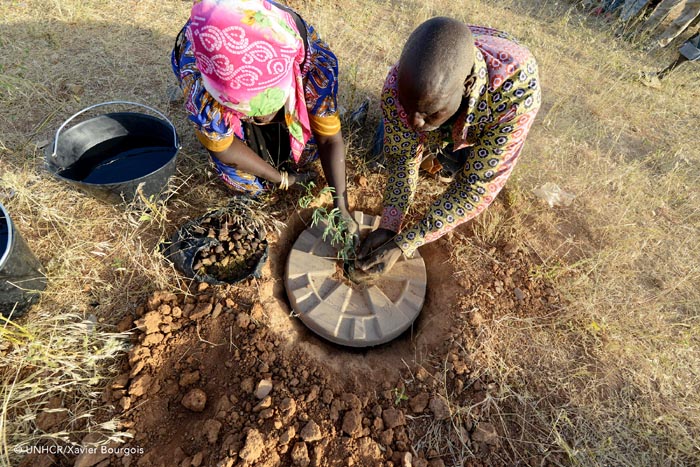|
|

|
  
Features
Update 2018/5/9
Technology
SUSTAINABILITY MEETS HUMANITARIAN WORK - REFORESTATION OF THE MINAWAO REFUGEE CAMP
This story is brought to you by by Water Today Research
by Cori Marshall

Last summer WaterToday reported on the Land Life Company, and a product that would aid in reclaiming degraded land. The Cocoon, a biodegradable basin, allows for trees to take root in arid conditions.
The Land Life Company partnered with the UNHRC - the UN Refugee Agency - and the Nationale Postcode Loterij, the largest lottery in the Netherlands, on a greening project in the Minawao Refugee Camp in the Far-North Region of Cameroon. The project aims to plant 40 thousand trees using the innovative cocoon technology.
On April 20, 2018, a short documentary film, It Will Be Green Again, was released. The film documents the project and sustainable solutions that are employed and promoted through the eyes of the Okoro family, who currently reside in the camp.
We had the opportunity to speak with Charlotte Jongejan, Head of Marketing and Communications for the Land Life Company, about the project.
Jongejan explained that there were discussions with the UNHCR and that there was an understanding that "migration woes are worsened or caused by climate change, and its consequences."
"Land degradation, and all the resulting heartache that comes from that means that people can no longer live off of the land of their own and are forced to move," she said.
Underlining that "this is worsened by social situations, like Boko Haram in Nigeria, that really compound the problem."
"We see increasingly that climate changes are caused by large groups of people on the move," Jongejan said. "offering them a tent, healthcare and food is of course extremely important, but it's no longer enough." Jongejan added, "we need to start looking at problems holistically and tackle them from all angles."
"UNHCR is becoming more aware of this and are doing lots of works to try to integrate climate change mitigation," Jongejan said, "but they weren't sure how to go about it." This is how the partnership came about.
With €2.4 million in grants they set out to find a suitable place to begin, and that place was the Minawao Refugee Camp. The project began planting the trees in December 2017. They have not reached the target number, though Jongejan said that "the team is currently there to plant the remaining trees, and at the end of this planting session we will be at 40 thousand trees."
The experience has been reciprocal between the two organizations. Jongejan said that the Land Life team "learned a lot about humanitarianism and the UNHCR learned a lot about land degradation, it's been really interesting working together."
Clearly, the two issues intersect, Jongejan explained that "one of the biggest problems with refugee camps is that [the land they are on] often is much worse when people leave." This creates problems for the host society that wants to be welcoming and at the same time have to live off the land.
The project that was undertaken at Minawao Refugee Camp was not simply about planting trees, there are social components that have an impact on the lives of those who are displaced.
Jongejan explained, "the reforestation has many aspects, it's providing food, jobs, helps to bring back water infiltration and retention in the soil, which brings back wildlife."
"There is no point planting trees if people are forced to go into the forest and cut them down because they have nothing to cook with," Jongejan said. The solution to this problem was “to create the fire fuel briquette factory." The factory is providing some of the work created by this project, Jongejan underlined that "it's mostly women, [who work there], who can support their families and improve their income."
The briquettes themselves are made from "waste products, nutshells and grasses." Jongejan said that they "are used to fire up their eco-stoves."
Eco briquettes are only one part of the multi-faceted approach. Jongejan said that "another solution was mudbrick production." This not only created jobs it also "allowed people to build much safer sturdier homes which offer more security and a real sense of dignity."
Jongejan said that she "spent a lot of time in the camp," and the people there "want to work, they want to provide, they also see that they are there and want to make the best of it." The people who are residing in the camp realize that "they are not on their own land and want to take care of it the best they can."
"The response was amazing." She said,in fact, they "would have to have planted double the amount of trees to give everyone a job." Jongejan described the people as "extremely hard-working."
The project is progressing, and Land Life is monitoring it with a wide range of technology, which includes GPS tags on the trees themselves. The Cocoon has performed "amazing" throughout. Jongejan said that "it hasn't rained at all since December, and the temperature has been 33 plus." Even in these conditions "the trees are at about 80% survival, which is extremely high for a place like northern Cameroon."
UNHCR figures indicate that there are 65.6 million forcibly displaced people worldwide, 22.5 million refugees, and 10 million stateless people. In 2016 approximately 189 thousand refugees were resettled.
cori.m@watertoday.ca
|
|
|
Have a question? Give us a call 613-501-0175
All rights reserved 2025 - WATERTODAY - This material may not be reproduced in whole or in part and may not be distributed,
publicly performed, proxy cached or otherwise used, except with express permission.
|
| |